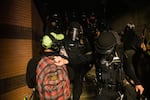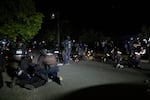A widely anticipated U.S. Department of Justice report issued Wednesday found the city of Portland is once again not in compliance with a federal agreement on how the Portland Police Bureau uses force and conducts officer oversight.
The 2014 settlement agreement was put in place after a federal investigation found Portland officers were using excessive force on people with mental health needs. Wednesday’s updated report cites failures across a number of sections encompassing use of force, training and officer accountability.
The Portland Police Bureau has had a bruising year since February 2020, when Justice Department lawyers found the city in substantial compliance with the nearly 200 reforms required under the agreement.
After a round of pandemic induced budget cuts in the spring, the bureau was consumed by a massive racial justice uprising focused almost exclusively on racist policing. Portland police spent much of the summer and early fall squaring off against hundreds and often thousands of demonstrators in nightly protests, where police would regularly use tear gas and impact munitions – resulting in thousands of use-of-force incidents.

A Portland police officer pushes a National Lawyers Guild legal observer during George Floyd protests last year.
Jonathan Levinson / OPB
The city has to be in compliance for one full year to fulfill the requirements of the Justice Department agreement and bring the outside oversight to an end.
Wednesday’s report essentially reset that clock again.
Echoing a common complaint from protesters and civil rights activists, the report found that Portland officers regularly used force against large crowds during the summer when only a select few posed a threat.
“PPB members used force, some beyond policy,” the DOJ found. “Supervisors approved that force, some without required critical assessment.”
The report also called out the police bureau’s over-reliance on the long range acoustic device, or LRAD, to communicate with protesters. Further, it found that officers conflated active and passive aggression, failed to interview witnesses, and didn’t report or review use of force in a timely manner.
“For the last eight years, we’ve been working with Department of Justice under the settlement agreement to refine policies and training,” Portland Police Chief Chuck Lovell said. “All the policies we have now are DOJ approved. We make tweaks and changes to those as necessary but that’s just a very fluid, live conversation.”
The DOJ disagrees.
At least one of the reasons it found PPB out of compliance was that after Mayor Ted Wheeler, who is also the police commissioner, restricted the use of tear gas in September, PPB didn’t respond to Justice Department requests for specifics on how that policy would be implemented until Jan. 13.
DOJ also found that the mayor’s Sept. 9 press release “directing the Portland Police to end the use of CS gas for crowd control” was the only guidance PPB received, and that later clarification that CS gas could still be used to when there is a “threat to life safety” contradicted the original press release, leading to confusion.
“Having received unsatisfactory responses to our many requests, we now base our compliance assessment, in part, on the City’s failure to seek and receive approval from the Department of Justice for what amounts to a change in force policy,” DOJ lawyers wrote.
Critics of the bureau say the focus on policies is only part of the equation.
“We have continued to express to DOJ and the other parties of the lawsuit that there is a distinguished gap between having the policies and the actual practice of the policies that exist,” said Dr. LeRoy Haynes, a civil rights advocate and co-chair of the Albina Ministerial Alliance Coalition for Justice and Police Reform, one of two advocacy groups the judge overseeing the settlement has allowed to weigh in on issues related to the case.
“The officers on the beat are not actually practicing the de-escalation policies,” Haynes said.

On the 100th consecutive night of mass protests against systemic racism and police brutality in Portland, protesters gathered in East Portland and clashed with police for hours. Police, who arrested 59 people throughout the night, declared the gathering a riot after a demonstrator threw a Molotov cocktail at the police.
Jonathan Levinson / OPB
In its report, the federal government supported Haynes’ criticism.
“Some supervisors validated uses of force with little or no critical assessment — even uses of force that were captured on video and replayed on new media, or later became subject to complaints,” the report reads. “Validation of individual uses of force with little or no discussion of reasonableness of the force used or of de-escalation attempts, stands in contrast to PPB’s policy requirements for force investigations and PPB’s expressed organizational goals.”
The failure to critically assess uses of force after they happen is another reason the city is partially out of compliance. Federal prosecutors overseeing the settlement agreement expressed concerns with whether PPB is holding officers accountable for misconduct.
“The absence of supervisory investigations deprives the accountability system of data needed if allegations of misconduct arise, such as witness interviews,” the report states.
The lack of interviews presents a challenge to city investigators charged with determining if a policy violation occurred. And as those complaints have piled up this summer, the group charged with reviewing those cases, Independent Police Review, is failing to meet the mandated timeline under the federal agreement.
Finally, the Justice Department report says Portland police are failing to meet training and community engagement obligations. The bureau is required to present its annual report to City Council and in the three precincts. In previous years, that has happened mid-summer, but the bureau didn’t present its most recent, 2019 report until December 2020. The bureau didn’t present its report in all three precincts either, citing challenges with the pandemic and protests.
The community engagement and use of force shortcomings are happening a week after Portland police reassigned some community engagement and behavioral health unit officers back to patrol as a way to compensate for staffing shortages. Under the settlement agreement, the city is required to have three Behavioral Health Response Teams consisting of a patrol officer and mental health professional. The city had been exceeding that standard with five teams, but as of Thursday it is back down to the minimum three.
The Justice Department is adamant that politics has never influenced its evaluations of the Portland Police Bureau. But Haynes said that for four years, he watched the Trump administration backtrack on police accountability.
“It became absolutely lax,” Haynes said. “The whole goal became to push them to hurry up and finish up the agreement and get out of it as quickly as possible so they can not hold departments accountable.”
In this week’s report, the first since President Trump left office, Haynes said he sees a readjustment back to the original intent of the agreement as imagined by the Obama administration.


